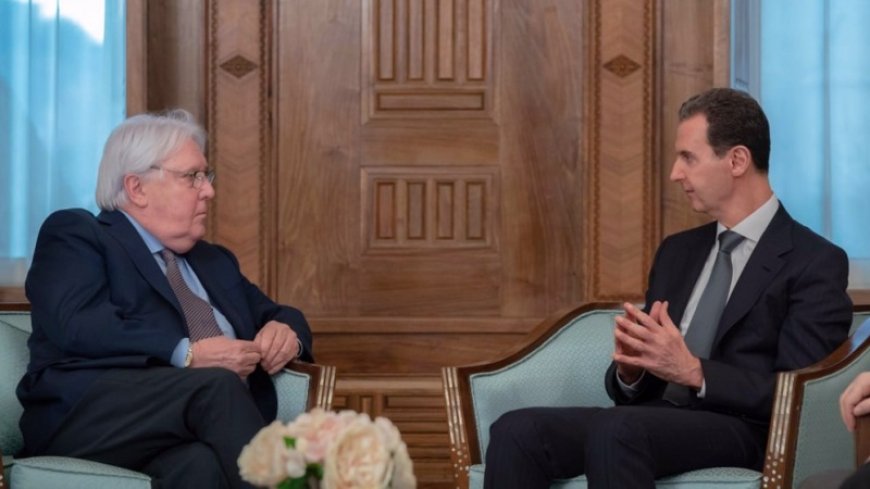Syria criticizes US sanctions for obstructing humanitarian aid
Syria criticizes US sanctions for obstructing humanitarian aid

Syrian President Bashar al-Assad said emergency humanitarian aid must reach all earthquake-hit areas in northwestern Syria, including those not under the control of the Damascus government. Assad made the remarks during a meeting with Martin Griffiths, the Under-Secretary-General for Humanitarian Affairs and United Nations Emergency Relief Coordinator, and his accompanying delegation in the Syrian capital Damascus.
During the meeting, the two sides discussed the aftermath of last week's deadly earthquake in the worst-hit areas of Latakia, Hama, Aleppo and Idlib, with the Syrian President assuring that assistance must be provided to victims in all quake-devastated cities in north-western Syria, including militant areas. The Syrian President also said that international efforts must focus on rebuilding Syria's vital infrastructure as this is of great urgency for the stability of Syrians and the return of displaced people to their communities.
For his part, Griffiths appreciated the Syrian government's quick response in terms of disaster relief. He underscored that the United Nations will support search and rescue operations in Syria and will facilitate the delivery of humanitarian aid to the north-western part of the war-torn country.
"Lifting of temporary US sanctions insufficient"
Syrian Permanent Representative to the United Nations Bassam Sabbagh has rejected the United States' decision to issue a six-month sanctions waiver for all transactions related to disaster relief after the powerful earthquake, saying the measure was "insufficient" to deal with it offset the long-term consequences. long-term bad consequences of the coercive measures.
Speaking at a closed session of the UN Security Council on the humanitarian situation in Syria in the wake of the earthquake on Monday, Sabbagh said there was an international delay in extending a helping hand due to the US-led illegal economic coercive measures, the effects of which "are no less destructive than the devastating earthquake." He said more than 250,000 Syrian citizens have been displaced as a result of the recent disaster.
"In order to ensure the timely delivery of humanitarian aid to all regions affected by the earthquake, Syria agrees to open further border crossings in the northern part of the country for an initial period of three months," said the senior Syrian diplomat. Sabbagh said his country was in dire need of humanitarian assistance after the recent 7.8 magnitude earthquake, arguing that US sanctions and unilateral western coercive measures have complicated the situation.
"Those not affected by the earthquake should not die from cold, starvation, lack of medical care and/or a safe shelter," he said. He said there is an urgent need for infrastructure and facilities damaged by the earthquake, including water supply and sewage networks, hospitals and clinics, to be repaired quickly to prevent the spread of infectious diseases. The death toll in the 7.8-magnitude earthquake that struck Syria on February 6 has risen to more than 5,814, according to the United Nations and the Syrian government. The death toll in neighboring Turkey has also risen to 31,643.
Most of the death toll in Syria occurred in the area held by the Takfiri terrorist groups. The United Nations says an anti-government group, classified as a terrorist group by the international community, is preventing aid shipments from being delivered to earthquake-hit areas in northern Syria. A spokesman for the UN Humanitarian Aid Office said on Sunday there were "problems with consent" with the group identified as terrorist Hayat Tahrir al-Sham (HTS). The group has used deadly force against the Syrian people and government forces since 2011, when the Arab country was in the grip of foreign-backed terrorism.
Assad made the remarks during a meeting with Martin Griffiths, the Under-Secretary-General for Humanitarian Affairs and United Nations Emergency Relief Coordinator, and his accompanying delegation in the Syrian capital Damascus. During the meeting, the two sides discussed the aftermath of last week's deadly earthquake in the worst-hit areas of Latakia, Hama, Aleppo and Idlib, with de













































